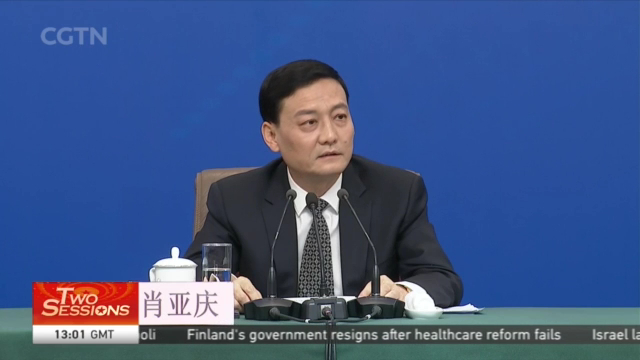
21:26, 09-Mar-2019
Reforming China's State Owned Companies: What's new this year for the long-time task
Updated
21:20, 12-Mar-2019
02:21

China's state assets supervision and administration on Saturday told media that it will advance the reform for state owned companies. That includes more actions in mixed-ownership reform and further state economy opening up. What are the issues at stake? Xia Cheng reports from the sideline NPC press conference in Beijing.
China's reform on state-owned companies matters to the economic stability and financial risk control. That's the word from Xiao Yaqing, chief of China's state asset superviser.
XIAO YAQING CHIEF, STATE-OWNED ASSETS SUPERVISION & ADMINISTRATION COMMISSION "SOEs should carry out screening work and do analysis at first. State owned companies should take targeted measures, and build their own risk-prevention mechanisms, instead of taking the one-size-fits-all approach."
XIAO YAQING CHIEF, STATE-OWNED ASSETS SUPERVISION & ADMINISTRATION COMMISSION "There's no law about subsidizing China's state owned companies. And there's no policy for that either. We are also tackling this kind of subsidies. SOEs and other companies are the same when it comes to market competition. We will further open up the SOE sector to market competition and international stakeholders."
This January and February, the central SOEs saw a 3.9-percent increase in revenue and a 15.3-percent profit growth, according to Xiao. As China combats economic slowdown, state owned companies' profitability is under pressure. That means China will continue to explore ways to separate state asset management and business operations to boost SOEs' efficiency. Power, crude and railway are the three sectors in focus. Mixed ownership reform will continue. And the state asset manager is, for the first time, looking to hire professional managers outside the SOE circle for leadership roles, mostly in major SOEs' affiliates. Those measures would be essential to bring diversity to the state economy to battle the economic headwinds ahead. XC CGTN BEIJING.

SITEMAP
Copyright © 2018 CGTN. Beijing ICP prepared NO.16065310-3
Copyright © 2018 CGTN. Beijing ICP prepared NO.16065310-3